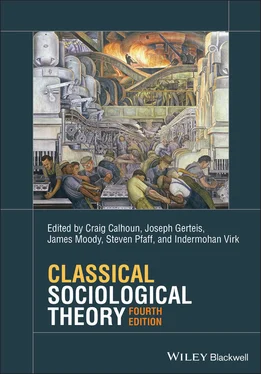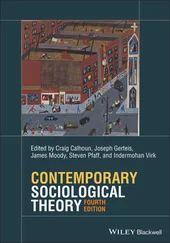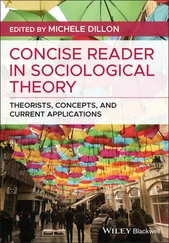Classical Sociological Theory
Здесь есть возможность читать онлайн «Classical Sociological Theory» — ознакомительный отрывок электронной книги совершенно бесплатно, а после прочтения отрывка купить полную версию. В некоторых случаях можно слушать аудио, скачать через торрент в формате fb2 и присутствует краткое содержание. Жанр: unrecognised, на английском языке. Описание произведения, (предисловие) а так же отзывы посетителей доступны на портале библиотеки ЛибКат.
- Название:Classical Sociological Theory
- Автор:
- Жанр:
- Год:неизвестен
- ISBN:нет данных
- Рейтинг книги:3 / 5. Голосов: 1
-
Избранное:Добавить в избранное
- Отзывы:
-
Ваша оценка:
- 60
- 1
- 2
- 3
- 4
- 5
Classical Sociological Theory: краткое содержание, описание и аннотация
Предлагаем к чтению аннотацию, описание, краткое содержание или предисловие (зависит от того, что написал сам автор книги «Classical Sociological Theory»). Если вы не нашли необходимую информацию о книге — напишите в комментариях, мы постараемся отыскать её.
Classical Sociological Theory — читать онлайн ознакомительный отрывок
Ниже представлен текст книги, разбитый по страницам. Система сохранения места последней прочитанной страницы, позволяет с удобством читать онлайн бесплатно книгу «Classical Sociological Theory», без необходимости каждый раз заново искать на чём Вы остановились. Поставьте закладку, и сможете в любой момент перейти на страницу, на которой закончили чтение.
Интервал:
Закладка:
Karl Marx, “Classes,” pp. 870–871 from Karl Marx and Friedrich Engels, Collected Works , Vol. 37. New York: International Publishers, 1975. English translation © 1975 International Publishers, Inc. Reproduced with permission of International Publishers, Inc.
Chapter 16
Karl Marx, “Fetishism of Commodities and The Secret Thereof,” pp. 42–46, 48–49 from Capital: An Abridged Edition , edited by David McLellan. Oxford: Oxford University Press, 1995. Reproduced with permission of Oxford University Press.
Chapter 17
Karl Marx, “General Formula of Capital,” pp. 93–98, 99–100 from Capital: An Abridged Edition , edited by David McLellan. Oxford: Oxford University Press, 1995. Reproduced with permission of Oxford University Press.
PART IV
Chapter 18
Emile Durkheim, from The Rules of Sociological Method , 8th edition, translated by Sarah A. Solovay and John H. Mueller, edited by George F.G. Catline. University of Chicago Press., 1938.
Chapter 19
Emile Durkheim, pp. 1–2, 24–29, 38–41, 60–63, 68–71, 83–85,200–205, 301–306 from Emile Durkheim, The Division of Labor in Society , translated by W.D. Halls. English translation © 1984 The Free Press. Reproduced with permission of The Free Press, a division of Simon & Schuster, Inc.
Chapter 20
Emile Durkheim, “ The Elementary Forms of The Religious Life ,” translated by Joseph W. Swain. G. Allen & Unwin, 1915.
Chapter 21
Emile Durkheim, pp. 209–210, 211, 212, 213, 220–221, 246, 247–248, 249, 252, 253, 258, 274, 275, 276 from Suicide: A Study in Sociology , translated by John A. Spaulding and George Simpson. English translation © 1951 (renewed 1979) The Free Press. Reproduced with permission of The Free Press, a division of Simon & Schuster, Inc.
PART V
Chapter 22
Max Weber, “Objectivity’ in Social Science,” pp. 89–99, 110–112 from The Methodology of the Social Sciences , edited and translated by Edward A. Shils and Henry A. Finch. English translation © 1949 The Free Press; © renewed 1977 Edward A. Shils. Reproduced with permission of The Free Press, a division of Simon & Schuster, Inc.
Chapter 23
Max Weber, “Basic Sociological Terms,” pp. 88–103, 107–117 from The Theory of Social and Economic Organization , translated by A.M. Henderson and Talcott Parsons. English translation © 1947 (renewed 1975) Talcott Parsons. Reproduced with permission of The Free Press, a division of Simon & Schuster, Inc.
Chapter 24
Max Weber, pp. 61–65, 69–79, 86, 151–159 from The Protestant Ethic and the Spirit of Capitalism with Other Writings on the Rise of the West , 4th edition, translated by Stephen Kalberg. Oxford University Press, 2010. Reproduced with permission of Oxford University Press.
Chapter 25
Max Weber, “The Distribution of Power within the Political Community: Class, Status, Party,” pp. 180–195 from Essays in Sociology , edited and translated by H.H. Gerth and C. Wright Mills. New York: Oxford University Press, 1946. Reproduced with permission of Oxford University Press.
Chapter 26
Max Weber, “The Types of Legitimate Domination,” pp. 324–325, 328–330, 333–334, 341–343, 358–364, 367, 369–370 from The Theory of Social and Economic Organization , translated by A.M. Henderson and Talcott Parsons. English translation © 1947 (renewed 1975) Talcott Parsons. Reproduced with permission of The Free Press, a division of Simon & Schuster, Inc.
Chapter 27
Max Weber, “Bureaucracy,” pp. 135–144, 149–158, 163–164, 173–178 from Essays in Sociology , edited and translated by H.H. Gerth and C. Wright Mills. New York: Oxford University Press, 1946. English translation © 1946, 1958 H.H. Gerth and C. Wright Mills. Reproduced with permission of Oxford University Press.
PART VI
Chapter 28
George Herbert Mead, “The Self,” pp. 135–144, 149–158, 163–164, 173–178 from Mind, Self and Society: From the Standpoint of a Social Behaviorist , edited by Charles W. Morris. Chicago: University of Chicago Press, 1934. © 1934 University of Chicago Press. Reproduced with permission of The University of Chicago Press.
Chapter 29
Georg Simmel, “The Stranger,” pp. 143–149 from On Individuality and Social Forms , edited by Donald N. Levine. Chicago: University of Chicago Press, 1971. © 1971 University of Chicago Press. Reproduced with permission of The University of Chicago Press.
Chapter 30
Georg Simmel, “The Dyad and the Triad,” pp. 145, 146, 147, 148–149, 154, 155–157, 159, 161–162, 167–169 from The Sociology of Georg Simmel , translated and edited by Kurt H. Wolff. English translation © 1950 (renewed 1978) The Free Press. Reproduced with permission of The Free Press, a division of Simon & Schuster, Inc.
Chapter 31
Georg Simmel, “The Metropolis and Mental Life,” pp. 324–333, 334–336, 338–339 from On Individuality and Social Forms: Selected Writings , edited by Donald N, Levine. University of Chicago Press, 1971. Reproduced with permission of The University of Chicago Press.
Chapter 32
W.E.B. Du Bois, pp. 1–9 from The Souls of Black Folk . New York: Bantam Books, 1989.
Chapter 33
W.E.B. Du Bois, “The Damnation of Women,” pp. 163–165, 166–173, 174, 179–186 from Darkwater: Voices from Within the Veil . New York: Harcourt, Brace and Howe. 1920.
PART VII
Chapter 34
Max Horkheimer, “Traditional and Critical Theory,” pp. 188–189, 190–192, 194–195, 197, 205–207, 208–210, 213–216, 221–223, 232–233, 234–236, 237, 241–243 from Critical Theory: Selected Essay s, translated by Matthew J. O’Connell et al. New York: Continuum, 1972. Reproduced with permission of The Continuum International Publishing Company.
Chapter 35
Max Horkheimer and Theodor W. Adorno, “The Culture Industry: Enlightenment as Mass Deception,” pp. 95–97, 99–100, 108–113, 115–117, 128–133, 135–136 from The Dialectic of Enlightenment: Philosophical Fragments , edited by Gunzelin Schmid Noerr, translated by Edmund Jephcott. Stanford: Stanford University Press, 2002. English translation © 1944 by Social Studies Association, NY; new edition © 1969 by S. Fisher Verlag GmbH, Frankfurt am Main 1969. Reproduced with permission of Stanford University Press.
Chapter 36
Herbert Marcuse, pp. 1, 3–5, 7–8, 71–80, 82–83 from Herbert Marcuse, One-Dimensional Man: Studies in the Ideology of Advanced Industrial Society . © 1964 by Herbert Marcuse. Reproduced with permission of Beacon Press.
Chapter 37
Hannah Arendt, “Reflections on Violence,” pp. 1–2, 3–4, 11–13, 14–15, 18–19, 21–22, 32–33, 35 from “Political Conflict: Perspectives on Revolution,” Journal of International Affairs 23: 1 (1969). Reproduced with permission of Journal of International Affairs Editorial Board.
PART VIII
Chapter 38
Karl Mannheim, pp. 55–59, 94–96, 192–200, 203–204 from Ideology and Utopias: An Introduction to the Sociology of Knowledge , 1st edition, translated by Louis Wirth and Edward Shils. Routledge, 1991. Reproduced with permission of Taylor & Francis Group.
Читать дальшеИнтервал:
Закладка:
Похожие книги на «Classical Sociological Theory»
Представляем Вашему вниманию похожие книги на «Classical Sociological Theory» списком для выбора. Мы отобрали схожую по названию и смыслу литературу в надежде предоставить читателям больше вариантов отыскать новые, интересные, ещё непрочитанные произведения.
Обсуждение, отзывы о книге «Classical Sociological Theory» и просто собственные мнения читателей. Оставьте ваши комментарии, напишите, что Вы думаете о произведении, его смысле или главных героях. Укажите что конкретно понравилось, а что нет, и почему Вы так считаете.












